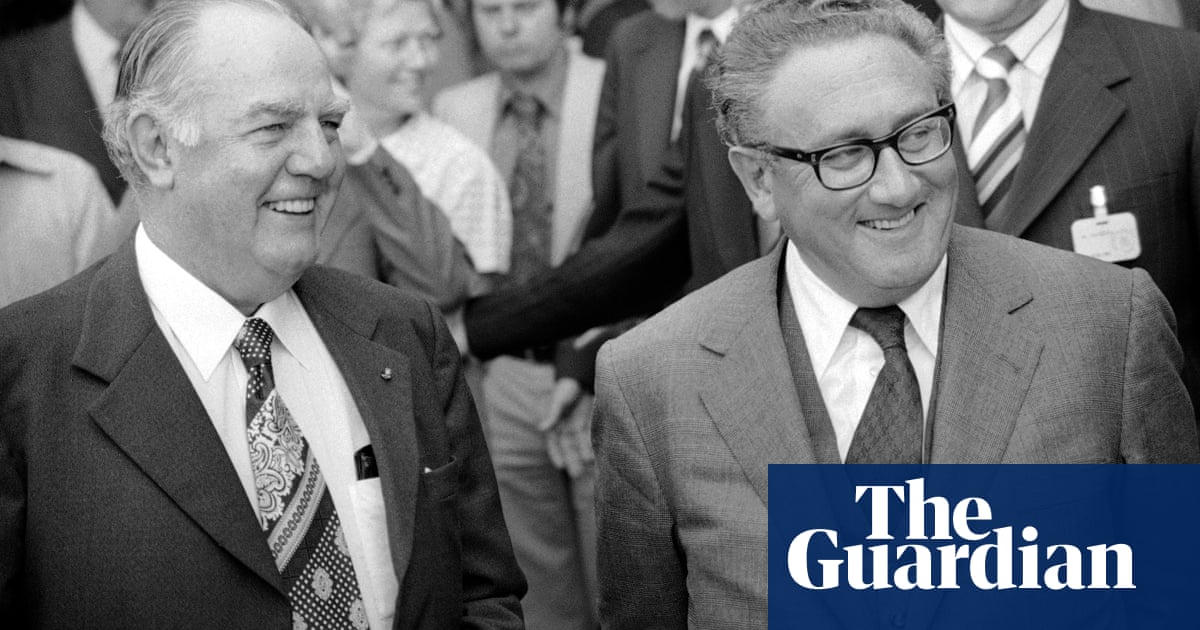
liver Hermanus delivered a gut punch in 2011 with his powerful film Skoonheid, or Beauty. Now he has directed a fiercely engaged, complex drama of sexual identity and suppressed yearning in apartheid-era South Africa – a film with a humid intensity. It is also a war movie about a country at war with itself, with its neighbours and with the whole world. Hermanus and his co-writer, Jack Sidey, have adapted the novel by André Carl van der Merwe, entitled Moffie – the (still very much unreclaimed) Afrikaans word for “faggot”.
Kai Luke Brummer plays Nicholas van der Swart, a white South African teenager in 1981 who has to do two years’ national service. This means grisly basic training and then a terrifying “border tour” – young trainees must move upcountry to engage the enemy in a real shooting war. Angola and the Soviet-backed MPLA (immortalised in the Sex Pistols’ Anarchy in the UK) loom on the border of the South West Africa territory – now Namibia – and are used as an ever-present bogeyman to keep South Africa’s young white manhood in a permanent state of aggressive paranoid readiness and to provide an ideological anti-communist rationale for apartheid itself. Young van der Swart suppresses his fear at this vicious dehumanising experience and also his own gay sexuality, because “moffies” are treated as the enemy within and could expect to be beaten and brutalised.
Hermanus creates some grimly compelling scenes as Nicholas arrives at the training camp after a gruesome train journey, during which the young proto-squaddies indulge in racist insults at black men on station platforms. The drill sergeant is a traditional figure here, and Hilton Pelser’s performance as the monstrous Sergeant Brand measures up in sadism and abuse. Hermanus shows how, from the very first, Brand displays his own mysterious enthusiasm for homophobic abuse, screaming into the young men’s flinching faces his sneering questions about their alleged interest in each other’s bodies. In the camp, furtive glances in the showers and lavatories mean more, and the stakes are much higher. The same is true for Nicholas’s emotional connection with fellow trainee, Dylan (Ryan de Villiers).
Nicholas’s family background is what further complicates the dynamic. Despite his soft “English” looks, he has an Afrikaans name, but he has to explain he has taken the surname of his more robust stepfather after what appears to have been his parents’ divorce. His father (whose photograph Nicholas poignantly carries with him to the camp, almost like that of a sweetheart) is a gentle soul who, in an excruciating act of misjudged manliness, has given Nicholas a porn magazine to take to the camp with him. And it is his father who is to be at the centre of an enigmatic, superbly filmed and rather shocking “flashback” scene of Nicholas’s childhood, when he and his family were horribly humiliated at a holiday resort.
There is, arguably, a complication with regards to race. The story of a young white man seeing military action in the service of the apartheid regime, finding comradeship with other white men and never for one moment questioning what he is doing might look now like a tragic or pathetic story of naivety. (One of them, Sachs, played by Matthew Vey, offers some limited leftist talk of Mao and Che in a bar.) But, in this context, it is the gay white man, not the black man, who has victim status. Perhaps it is a stretch to find their intersectional common cause.
As with Claire Denis in her 1999 film Beau Travail, a reworking of the homoeroticism of Billy Budd in the context of the French Foreign Legion, Hermanus responds directly to the beauty of male bodies. This, too, is a complicated reaction. Most of the time the physicality on display is intimidating and violent, and yet it can also be a swooning epiphany of carefree beauty, more beautiful, in some forbidden and unknowable way, because of the violence.
We are accustomed to talk about toxic masculinity – and of course the masculinity of this film is mostly very toxic. But then, almost like a reflective object being turned a fraction of an inch to catch the light, the masculinity becomes non-toxic; it becomes supercharged with beauty and eroticism and tenderness.












